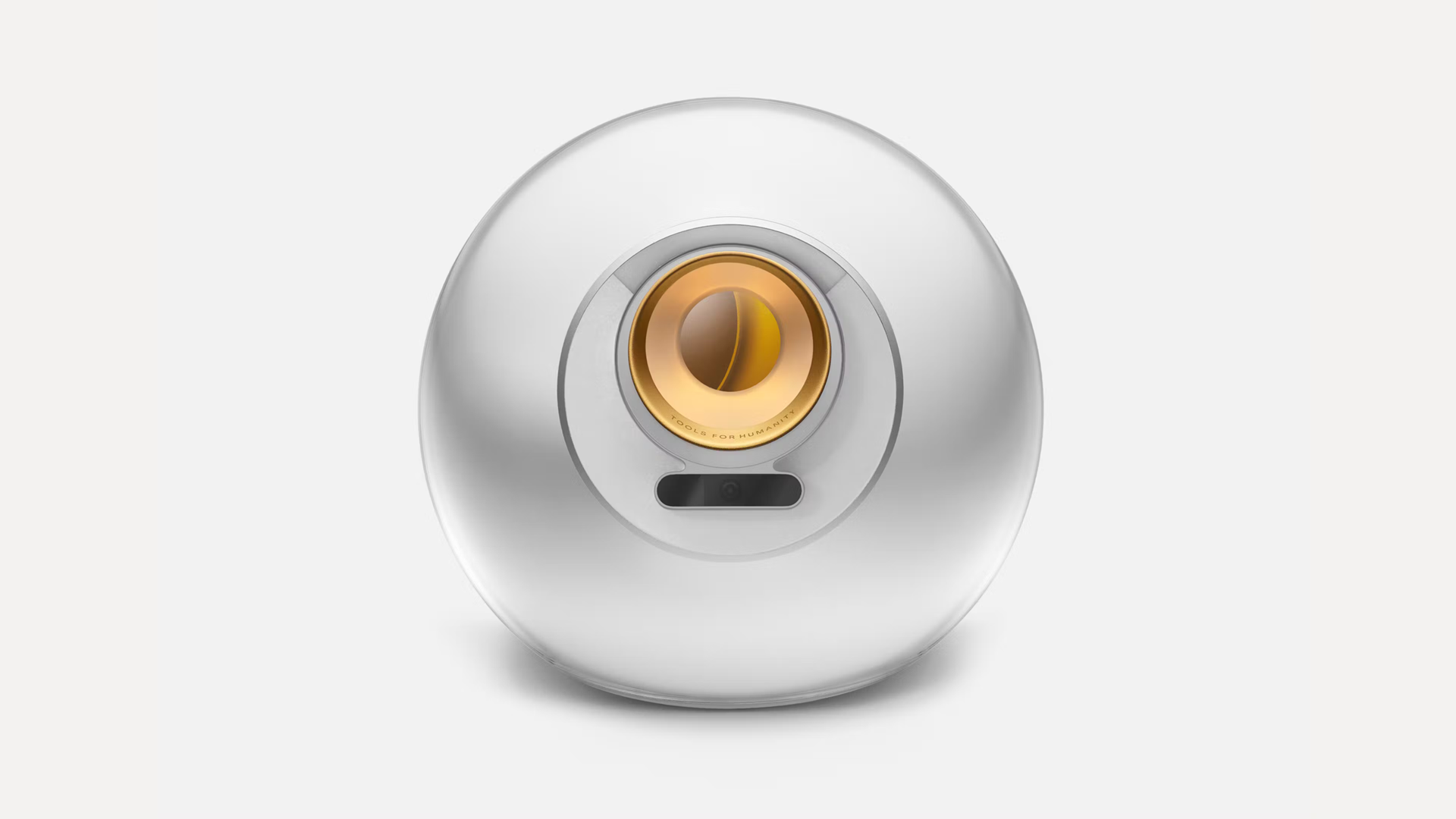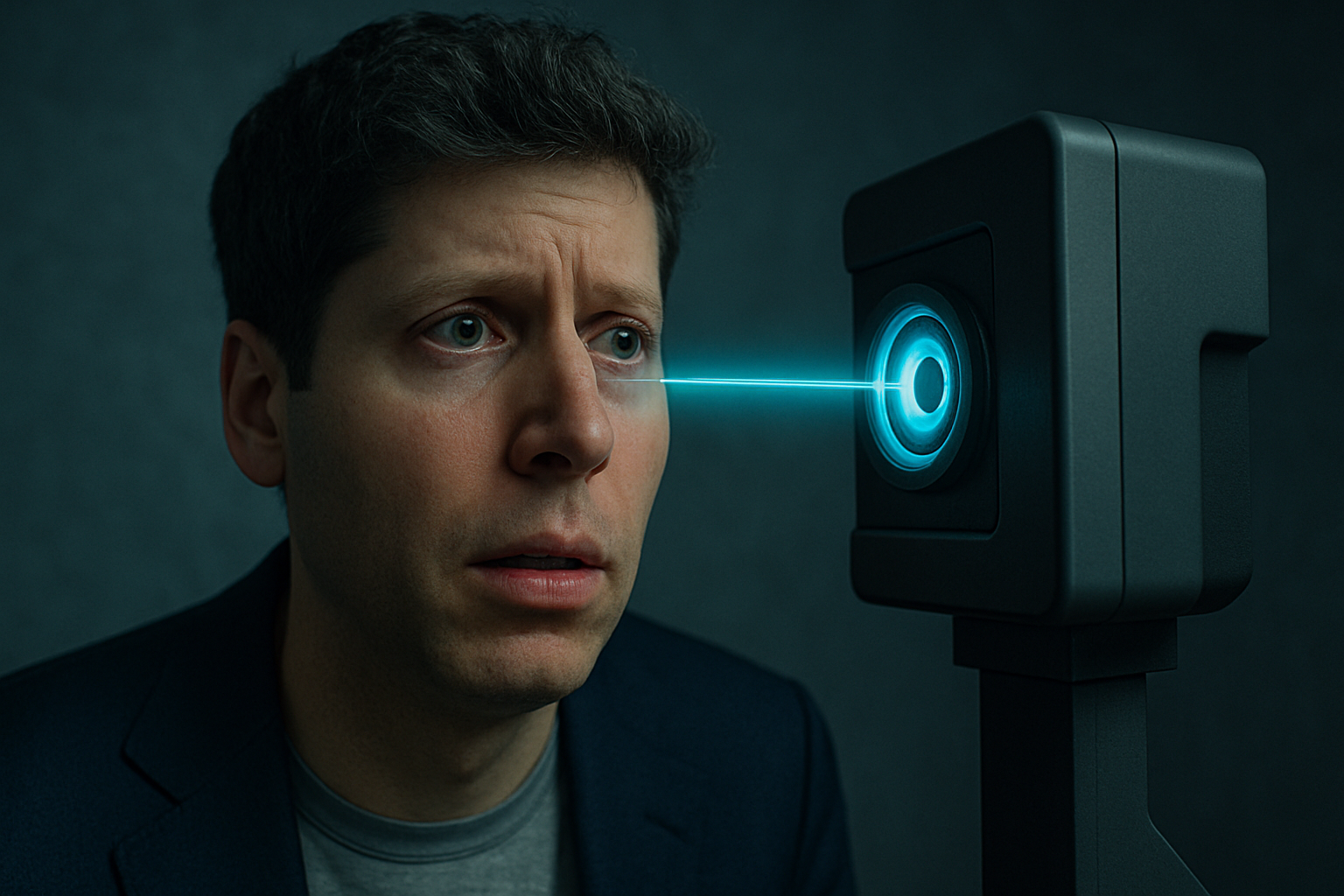
The Orb Mini: A Digital Marketing Game-Changer, or the Start of an Orwellian Internet?
We now live in a world where bots are sliding into DMs, deepfakes are making your granny look like she’s running for president, and “human” can sometimes feel like a stretch…
And now Sam Altman’s new toy might just be the solution marketers didn’t know they were waiting for.
Enter the Orb Mini, a device that scans your iris to confirm you’re actually a person, and not a robot.
What’s an Orb Mini, Anyway?
The Orb Mini is a slick little device that scans your iris – yes, your actual eyeball – to prove you’re a real human being in a digital world full of bots, deepfakes, and synthetic everything. It sounds nuts, but it’s real, portable, and rolling out now – and it just might reshape how we verify identity online.
Here are some ways it might work:
Social Media Verification – Users scan their iris to prove they’re real, helping platforms cut bots and boosting trust for marketers.
Identity Checks – Orb Mini replaces passports with iris scans to stop fraud and ensure only real people access financial tools and more.
In-Store Loyalty & Access – Shoppers verify their identity with a glance to unlock exclusive drops, perks, and VIP treatment in-store.

It sounds, and looks, like something straight out of a sci-fi film, but here it is – ready to help you prove your customers aren’t just a bunch of pixels in a profile picture.
For marketers, this could be the ultimate game-changer: real humans, real data, and no more wondering if your “target audience” is actually a sentient toaster.
Something Altogether Different
In the years that have passed since the birth of the internet, we’ve grown accustomed to things that aren’t quite what they seem. Fake Facebook profiles, bots running amok in your DMs, and questionable dating app accounts that smell a bit too much like a ‘deepfake’ – we’ve all been there.
This, though, is something altogether different. The Orb Mini isn’t just a machine to spot bots in your online game (though it does do that), nor is it a tool just to help you feel like a ‘real’ person at a shopping kiosk.
It’s a machine with a singular purpose: to prove that you, with your weird eyes, your particular brand of humanity, exist in this ever-crazy digital world. The Orb scans your iris, verifies your existence, and slaps a “World ID” on you, like a certificate that says: “Yes, this human is real, and they have irises to prove it.”
For the uninitiated, this might sound like a bad episode of Black Mirror. But Tools for Humanity, Altman’s brainchild, sees this as the answer to the “crisis of trust” that plagues the modern internet. We’re living in a time where you can’t even trust a person’s Instagram profile, much less their Twitter feed.
And deepfakes? We all know someone who’s fallen victim to them, or worse, someone who’s used them to make their life a bit more “exciting.” In short, the internet is now a carnival of deception, and we’re all just trying to find the exit.
Verify Your Existence
Now, imagine being able to walk up to a kiosk, look into an Orb Mini, and have it verify your existence. It’s your modern-day passport to proving that, yes, you’re a person – and not some clever code or slick bot trying to steal your identity. Sam Altman, co-founder of OpenAI, sees the Orb Mini as the key to a new kind of internet. An internet where we don’t just trust what we read or see, but can be absolutely certain that the person on the other side is, in fact, real.
But here’s the thing: does it work? Let’s not kid ourselves. We’ve all seen technology claim to solve our privacy woes, only to find out later that we were just participants in a grand experiment of who-can-we-scam-the-most.
The idea that you’re handing over your iris for some corporation to use? It raises more questions than it answers. Tools for Humanity insists it’s all safe. No iris images are stored; it’s anonymised data, blah blah. But let’s face it, when they’re scanning your eyes, asking you to trust them with the very thing that tells the world who you are, it’s hard not to be a little suspicious.
But here’s the gag: when you look around, trust is a rare commodity. So maybe we need to get to a place where we don’t just take people at their word or their pixels. Enter the Orb Mini. It promises a future where we know who we’re dealing with online, not based on a like or a click, but on the fact that someone has literally seen the windows to your soul.
And while that might seem like a ridiculous overreach, it’s hard to ignore that the very fabric of trust in the digital world has been fraying for years now. Scams, bots, fraudulent reviews – they’re everywhere. And the Orb Mini promises to clean it all up, one verified iris at a time.

A Reality Check
If you’re thinking this sounds like the next step toward an Orwellian nightmare, you wouldn’t be alone. After all, what is the internet, if not a world of make-believe where everyone is playing pretend?
But maybe that’s what we need – a reality check.
There’s a valid concern here: do we really want to live in a world where the gatekeepers are the ones with the power to verify who gets to be human? It’s one thing to sign up for an online game or swipe right on a dating app, but imagine a future where this level of verification is required to log into your email or buy groceries.
You don’t just prove you’re a person – you prove you’re the right person. If that doesn’t send a chill down your spine, I’m not sure what will. But let’s talk about the other side of this. There’s something delightfully 21st-century about the Orb Mini. Think about it: no more bots sneaking into your online dating profile or crashing your multiplayer game.
No more wondering whether the person you’re chatting to on a financial website is some poorly programmed AI trying to sell you a timeshare or even Bitcoin. The Orb Mini could be a game-changer for marketers.
Imagine being able to interact with a fully verified customer base – people who are real, human, and (hopefully) not trying to scam you. The possibilities for hyper-targeted advertising and personalised content are enormous.
Locked Out Of The Future
Now, don’t get too carried away with the shiny new toy. Sure, the Orb Mini could streamline consumer interactions, but we also have to consider the ethical implications. What happens to those who opt out? What happens to people who refuse to hand over their biometric data, either for privacy reasons or because they just don’t trust anyone with their eye scans? Do they get locked out of the future? Maybe, maybe not.
The real question is: Will marketers, advertisers, and companies start to see non-verified humans as second-class citizens in the digital world?
And here’s where it gets a bit sticky. As brands and tech companies race to adopt biometric verification, they’re also gearing up to gather unprecedented levels of personal data. Sure, it’s nice to know that every click, every purchase, every like is made by a real person – but at what point does all this personal data become too personal?
It’s one thing to target an ad based on your browsing history; it’s another to target it based on the fact that a machine knows your iris and can attach that data to your every online move. We’re no longer talking about cookie tracking – we’re talking about something that could track the very essence of who you are.
But don’t let all this get too gloomy. The Orb Mini could also usher in a new era of trust in the digital marketing world. Brands could rest easy knowing that their customers are, in fact, real human beings – no bots, no AI-generated deepfakes, no scams.
Privacy or Security?
The possibilities for honest, transparent engagement are tantalising. After all, who doesn’t want to know that the person they’re talking to on the other end of the screen isn’t trying to pull a fast one?
In the end, this all boils down to one fundamental question: what do we value more – privacy or security? With the Orb Mini, Sam Altman is betting that we’ll trade a little bit of privacy for a whole lot of security. After all, if you can prove you’re human, then surely you can trust the internet to play by the same rules. And if we’re all verified humans, maybe the internet won’t be such a scary place.
At least, until the next round of AI comes along. And then? Who knows? Perhaps we’ll be scanning our own irises just to make sure we’re not robots ourselves.
We can’t sell you an Orb Mini, but we can offer you a digital marketing strategy that’s as future-proof as your irises. Get in touch and let’s make sure you’re ready for whatever comes next.
